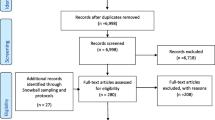Abstract
This paper describes key findings of two states that sought to integrate physical and behavioral health services by delivering them through one Medicaid managed care contract. The purpose was to explore how managed care organizations (MCOs) could improve physical and behavioral health integration. Promising practices include leveraging data accumulated by MCOs about beneficiaries to support providers and enhanced case management, encouraging MCOs to pay providers for care coordination and care collocation, and offering protections to providers and beneficiaries. Finally, in the absence of a shared vision among key stakeholders regarding how to best promote integrated care, a state can make progress by promoting stakeholder innovation.
Similar content being viewed by others
References
Archer, J., Bower, P., Gilbody, S., Lovell, K., Richards, D., Gask, L., et al. (2012). Collaborative care for depression and anxiety problems (review). The Cochrane Collaboration,10, CD006525.
Caswell, K. J., & Long, S. K. (2015). The expanding role of managed care in the Medicaid program: Implications for health care access, use, and expenditures for nonelderly adults. INQUIRY: The Journal of Health Care Organization, Provision, and Financing,52, 0046958015575524.
Cook, J. A., Fitzgibbon, G., Burke-Miller, J., Williams, M., Kim, J. B., Heflinger, C. A.,… & Stein-Seroussi, A. (2004). A multi-site study of Medicaid-funded managed care versus fee-for-service plans’ effects on mental health service utilization of children with severe emotional disturbance. The Journal of Behavioral Health Services & Research, 31(4), 384-402
Cummings, N. A., O’Donohue, W. T., & Cummings, J. L. (2009). The financial dimension of integrated behavioral/primary care. Journal of Clinical Psychology in Medical Settings,16(1), 31–39.
Cunningham, P. J. (2009). Beyond parity: Primary care physicians’ perspectives on access to mental health care. Health Affairs,28(3), w490–w501.
Dickey, B., & Hocine, A. (1996). Persons with dual diagnoses of substance abuse and major mental illness: Their excess costs of psychiatric care. American Journal of Public Health,86(7), 973–977.
Fossett, J. W., Goggin, M., Hall, J. S., Johnston, J., Plein, L. C., Roper, R., et al. (2000). Managing medicaid managed care: Are states becoming prudent purchasers? The hard reality of what it takes for states to take on the prudent-purchasing role, as seen in a five-state study. Health Affairs,19(4), 36–49.
Framework, A. P. M. (2016). Alternative Payment Model (APM) Framework: Final White Paper.
Frank, R. G., & Glied, S. A. (2006). Better but not well: Mental health policy in the United States since 1950. Baltimore: JHU Press.
Gifford, K., Ellis, E., Coulter Edwards, B., Lashbrook, A., Hinton, E., Antonisse, L., & Rudowitz, R. (2017). Medicaid moving ahead in uncertain times: Results from a 50-state medicaid budget survey for state fiscal years 2017 and 2018. Kaiser Family Foundation. Retrieved Septemer 27, 2019 from http://files.kff.org/attachment/Report-Results-from-a-50-State-Medicaid-Budget-Survey-for-State-Fiscal-Years-2017-and-2018.
Goodell, S., Druss, B.G., Walker, E.R. & MAT, M. (2011). Mental disorder and medical comorbidity. Robert Wood Johnson Foundation, 2. Retrieved Septemer 27, 2019 from http://www.rwjf.org/content/dam/farm/reports/issue_briefs/2011/rwjf69438.
Green, J. & Thorogood, N. (2018). Qualitative methods for health research. Sage.
Howell, E. M., Palmer, A., & Adams, F. (2012). Medicaid and CHIP risk-based managed care in 20 States. Washington, DC: The Urban Institute.
Koike, A., Klap, R., & Unützer, J. (2000). Utilization management in a large managed behavioral health organization. Psychiatric Services,51(5), 621–626.
MACPAC. (2015) Report to Congress on Medicaid and CHIP. Chapter 4: Behavioral Health in the Medicaid Program. People, Use, and Expenditures. Retrieved Septemer 27, 2019 from https://www.macpac.gov/wp-content/uploads/2015/06/June-2015-Report-to-Congress-on-Medicaid-and-CHIP.pdf.
Monson, S. P., Sheldon, J. C., Ivey, L. C., Kinman, C. R., & Beacham, A. O. (2012). Working toward financial sustainability of integrated behavioral health services in a public health care system. Families, Systems, & Health,30(2), 181.
National Institutes of Mental Health. (2015). Retrieved Septemer 27, 2019 from http://www.nimh.nih.gov/health/statistics/cost/total-expenditures-for-the-five-most-costly-medical-conditions-1996-vs-2006.shtml.
Palmer, A., Howell, E., Kenney, G. M., Abraham, P., & Costich, J. (2013). Risk-based managed care in kentucky: A second year implementation report and assessment of beneficiary perceptions. Washington, DC: Urban Institute.
Palmer, A., McMorrow, S., & Kenney, G. M. (2015). Risk-based managed care in New Hampshire’s Medicaid Program. Retrieved Septemer 27, 2019 from https://www.urban.org/sites/default/files/publication/39596/2000100-Risk-Based-Managed-Care-in-New-Hampshires-Medicaid-Program.pdf.
Raghavan, R., Leibowitz, A. A., Andersen, R. M., Zima, B. T., Schuster, M. A., & Landsverk, J. (2006). Effects of Medicaid managed care policies on mental health service use among a national probability sample of children in the child welfare system. Children and Youth Services Review,28(12), 1482–1496.
Ray, W. A., Daugherty, J. R., & Meador, K. G. (2003). Effect of a mental health “carve-out” program on the continuity of antipsychotic therapy. New England Journal of Medicine,348(19), 1885–1894.
Ridgely, M. S., Mulkern, V., Giard, J., & Shern, D. (2002). State mental health policy: Critical elements of public-sector managed behavioral health programs for severe mental illness in five states. Psychiatric Services,53(4), 397–399.
Rieckmann, T., Abraham, A., Zwick, J., Rasplica, C., & McCarty, D. (2015). A longitudinal study of state strategies and policies to accelerate evidence-based practices in the context of systems transformation. Health Services Research,50(4), 1125–1145.
Robst, J. (2012). Changes in antipsychotic medication use after implementation of a Medicaid mental health carve-out in the US. Pharmacoeconomics,30(5), 387–396.
Schramm, W. (1971). Notes on case studies of instructional media projects. Washington, D.C.: Academy of Educational Development.
Simeone, J. C., Marcoux, R. M., & Quilliam, B. J. (2010). Cost and utilization of behavioral health medications associated with rescission of an exemption for prior authorization for severe and persistent mental illness in the Vermont Medicaid program. Journal of Managed Care Pharmacy,16(5), 317–328.
Smith, V. K., Gifford, K., Ellis, E., Rudowitz, R., Snyder, L., & Hinton, E. (2015). Medicaid reforms to expand coverage, control costs and improve care: Results from a 50-state Medicaid budget survey for state fiscal years 2015 and 2016. Washington, DC: Kaiser Family Foundation.
Soper, M. H. (2016). Integrating behavioral health into medicaid managed care: Design and implementation lessons from state innovators. Incorporated: Center for Health Care Strategies.
Soper, M. H., Matulis, R., & Menschner, C. (2017). Moving toward value-based payment for medicaid behavioral health services. Center for Health Care Strategies.
Sparer, M. (2012). Medicaid managed care: Costs, access, and quality of care. Princeton, NJ: Robert Wood Johnson Foundation.
Stewart, M. T., Horgan, C. M., Quinn, A. E., Garnick, D. W., Reif, S., Creedon, T. B., et al. (2017). The role of health plans in supporting behavioral health integration. Administration and Policy in Mental Health and Mental Health Services Research,44(6), 967–977.
Weiss, J. A. (1999). Theoretical foundations of policy intervention. In F. G. Frederickson & J. Johnston (Eds.), Public management and innovation and reform (pp. 37–69). Birmingham: University of Alabama Press.
Weissman, E., Pettigrew, K., Sotsky, S., & Regier, D. A. (2000). The cost of access to mental health services in managed care. Psychiatric Services,51(5), 664–666.
Yin, R. K. (2017). Case study research and applications: Design and methods. Thousand Oaks: Sage publications.
Author information
Authors and Affiliations
Corresponding author
Ethics declarations
Conflict of interest
The authors have no potential conflicts of interest to disclose.
Research Involving Human Participants and/or Animals
This research was reviewed by an IRB and judged to be exempt from a full IRB Review because the information collected is not private.
Informed Consent
Interview participants provided verbal consent to be interviewed and were informed of the risks and benefits of their participation.
Additional information
Publisher's Note
Springer Nature remains neutral with regard to jurisdictional claims in published maps and institutional affiliations.
Rights and permissions
About this article
Cite this article
Palmer, A., Rossier Markus, A. Supporting Physical–Behavioral Health Integration Using Medicaid Managed Care Organizations. Adm Policy Ment Health 47, 316–322 (2020). https://doi.org/10.1007/s10488-019-00986-3
Published:
Issue Date:
DOI: https://doi.org/10.1007/s10488-019-00986-3




